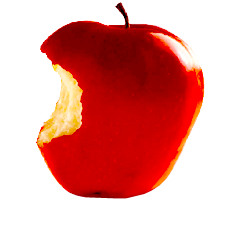On Residues
We all leave residues of our selves on the earth. Some more than others. We write and create and express our selves. Imagine that you spontaneously combusted this evening. Incinerated down to nothing but a small pile of ashes. The remainder is your residue. I’m not talking about the ashes, but the information about you that is left behind. The things you own. The state and organization of your house. Your bank statements. That report on Peru you wrote in the 7th grade, stuffed in a shoebox in the basement. The books on your bookshelf. The CDs and DVDs you own. Your wardrobe. Your e-mails, your web-bookmarks, your blog posts. Your answering machine message, photographs and home movies. All of these things and more — these residuals reflect who you were.
Now imagine an all-powerful computer — godlike in its intelligence and abilities. If it had full access to your residuals, how much could it infer about you? lets imagine it has a sample of your DNA and has the ability to construct your clone, with a tabula-rasa brain upon which it can attempt to recreate you from your residue. It can interview your friends and family. “What was he like?”, it asks. “What sorts of things did he talk about?”. These memories are also important residuals.
Based on all this information, how close to the original you would your clone be? It knows a great deal about you. It knows all about the intricacies of human psychology, culture, and relationships. While it may seem that there are a near-infinite (I hate that oxymoronic term, but I find my vocabulary lacks an alternative to the colloquial) number of different types of people you could be. We’re all individuals right? But with enough residual information, can this constraint-satsifaction problem be solved? If it cannot be solved, how small can the set of possible people which still contains you, be reduced?
Every little snippet of information about you narrows the search, eliminating massive chunks of possible brains from the set. For most of us, there is a huge discrepancy between the private mental life and what is expressed verbally or in writing. I imagine people reading this blog, who have never met me in person, undergo essentially the same task the super-computer would do, but at a much cruder level. Huge assumptions are made about me, by the reader, in order to fill a frame of reference with which to understand me. Certainly my blog posts are a mere shadow of my self. They are heavily biased, narrow in focus, thoroughly filtered, and potentially misleading. And yet no one else but me could have written this, exactly the way I have with the precise wording and vocabulary choices, and grammatical blunders.
With each and every shred of evidence, more is revealed about my brain structure, my lifetime of experiences, and my personality. While my mental life largely remains undocumented, the clues all lead to a more specified brain, constraining what I could have been thinking internally through each known moment of my life.
There’s a similar problem in Computer Science in the study of compression and information theory. The amount of information in a segment of data is defined as the shortest computer program that can output the data. You can have large chunks of data that contain very little information, because the data is simple, redundant, or predictable. For instance, a book with the numbers One through One Million. This would be a pretty long (and boring book). But there is very little information in this book, as the smallest computer program that can generate this data is very short:
Set VALUE to zero
While VALUE is less than one billion
Add one to VALUE
Print VALUE
While finding the shortest computer program to reproduce a data set is not the same problem as reconstructing a human from their residues, there are some similarities. In the compression problem, we are searching for the smallest program to generate the data. In the residue problem, we are looking for the brain that could plausibly be generated given the person’s DNA, and would have generated the same residues under the same conditions.
My question to you: How much do you have to leave behind to constrain the problem enough to be solvable? Does the average modern human leave enough? Do only the most prolific and documented amongst us create enough for a full reconstruction? Is there something none of us can leave as a residue, that is critical to solve the problem?







Knowing that you like fart jokes is sufficient to create a pretty fair likeness of you, me thinx.
Me on the other hand, I’m unique! (just like everybody else). There’s *no way* a computer program could ever predict what I’m about to say, the way, uhm, J does.
But seriously, I don’t think the residue would account for more than a small fraction of an interesting person such as yourself. So much experience has contributed to those particular nuances, and so little is expressed by mere actions and statements.
For example, you could tell the computer that I knew a lot about poker and probability. But how that affects how I see the world, every idea I generate, and every decision I make, is somewhat slightly unfathomable. Go ahead and duplicate that — I dare ya.
But that’s just, like, my opinion, man.
~d
I think the ability to create a true (self-aware) AI would be a precurser to solving this problem. Once the computer can think and learn and evolve, then you just have to constrain it to think and learn and evolve like you, and then simply train it with a replay of every last nuanced experience that constitutes your entire life.
After you do write this program, let it blog. Once it’s blog and this one are the same, we will know you got it right. Then one blog will just keep going after you die 😛
The computer would have to know a lot about farting, because you can tell a lot from a fart. Some say my farts remind them of a young George Orwell.
We just giv’er.
I do not think you could create a me identical to a specific instantiation of me (in a given point of space-time) without perfect information. So long as there is any amount inference on the part of the computer that is generating my pattern the likelyhood of creating an identical copy is only probabilistic. However, any instantiation of me created from any amount of residue (information) would likely be identical to some instantiation of me existing in a parallel universe somewhere but I don?t think that this is what you are trying to do. If you had an infinite shitload of processing power like Deutsch’s universal quantum computer, theorized to exist near the end of space-time, then you could render any physically possible environment. So render every physically possible environment based on however much residue you have and compare the instantiations of me that emerge in that environment to the desired instantiation. Use bubble sort to do the comparison, that’s pretty simple. I hope there is no time limit.
I think the program would grow smaller as our understanding of pshychology (in the scientific sense, not the theoretical) inreased. As our understanding of how our experiences affected us grows closer to real information as opposed to educated guesses, the program could make a reasonable, if not eventually perfect facsimile just based on what you refer to as residuals.
Something has to be said for what we’re trying to replicate. Predicting thoughts of 1 human being from his "residue" has got to be far more difficult than predicting say a million human beings from their residue…
… don’t we do that all the time? Analyzing and generalizing human behaviours into identifiable groups, market segements, countries, etc.
Is this all based upon the assumption that physiology is all there is to being human?
You have forgotten the uncharted area of the brain, my friend. The soul. You cannot input your soul into said programme, and I won’t get all religious on you but I believe that (very unscientifically) that your soul makes you completely and totally yourSELF.